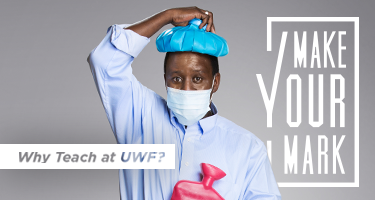Current Research Projects
Online Biostatistics Lab
With online education expanding dramatically, instructors are faced with decisions as to how to develop strategies and tools that not only stimulate active and dynamic learning environments but also evaluate how much the students are learning and retaining the information provided. We are developing an online interactive biostatistics lab for the Masters in Public Health program (MPH) at UWF so that we can address any barriers to learning that some students may have and prepare our students to meet the public health needs of whichever community they work in. Five online interactive modules with 15-20 interactive screens with rich visuals, sound design, and interactive technology are being designed to enhance the comprehension of critical statistics concepts. Pre and post-tests will be presented at the beginning and end of each module to assess changes in student learning outcomes. Statistical tests will be conducted to assess changes in student levels of knowledge between the pre and post module measurements and to evaluate whether or not modules with online biostatistics labs vs. modules without online tutorials influenced the changes in the level of knowledge.
One of the lab modules is provided for review - Online Biostatistics Lab. For more information about this project, please contact Dr. Denice Curtis at dcurtis@uwf.edu.
Stroke and Post-stroke Rehabilitation
Current research projects focus on health disparities related to stroke prevention and post-stroke rehabilitation. Emphasis on these two “ends” of the problem stems from a desire to lessen the economic, social, and personal impacts of stroke by better understanding the range of factors involved in prevention and rehabilitation strategies. Similar to many chronic diseases, stroke is not only more amenable to prevention (through lifestyle change interventions) but also disproportionally affects the economic, social, and personal factors when not prevented. Working to prevent stroke also connects explicitly to a wide range of public health crises currently facing us, such as obesity and cardiovascular conditions, and thus affords a platform for intervening into those public health problems as well.
Utilizing the Caries Risk Assessment Module (CAMBRA) in Ecuador
Dental disease is an often overlooked health issue with systemic implications and global distribution. Despite oral disease being preventable, many factors influence and predispose individuals to be impacted by it. This is evident by the fact that nearly 100% of adults have dental cavities, severe periodontal disease is found in 15-20% of adults between the ages of 33-44 years, and 60-90% of young children worldwide are affected by caries. Dental caries is a multifactorial disease and as with any infectious disease, it adheres to the epidemiological triad. As such, it requires all three factors: agent, environment, and host to be present for disease to occur. Understanding the interactions between these factors should allow researchers to examine dental disease as a multifactorial disease and to understand the application and use of a caries risk-assessment process in identifying the patient’s relative risk for dental caries. We conducted a minimally invasive clinical dental exam on 130 Ecuadorian children ages 6-12 years and used a modified Caries Management by Risk Assessment (CAMBRA) form to assess contributing and protecting factors for oral health. Preliminary data show that about 80% of the mothers or primary caregivers had active decay in the past year and did not have a dental home. Almost half of the children had not seen a dentist within the last year and some of them had never seen a dentist until the encounter with this study. The use of bottles or sippy cups with fluids other than water and frequent snacking was common in the communities. The results of the clinical exam indicated that the majority of the children had obvious dental decay, restorations, and dental plaque and a good proportion had also gingivitis. Caries Management by Risk Assessment (CAMBRA), should become a standard tool of the comprehensive oral examination conducted by any health care professional and should be used as the basis for a preventive and treatment plan.
The American Academy of Pediatrics (AAP) Oral Health Risk Assessment Tool was used in the study (English / Spanish). Journal of International Oral Health final article. For more information about this study contact Dr. Denice Curtis at dcurtis@uwf.edu
Assessing the Knowledge, Attitudes and Practices About Oral Disease Prevention Among Homeless Persons in Escambia County, Florida
Homelessness is a serious social problem in the U.S. Each year, an estimated 2 million people lack access to a conventional dwelling or residence. Research has shown that homelessness is directly associated with poor oral health and a lack of access to oral health care. Homeless adults have poorer oral health, more grossly decayed and missing teeth, and more unmet treatment needs than the general population. In 2017, almost 6,000 homeless individuals were seen throughout the safety net clinics in Escambia County, representing 14% of the clinics’ total patient population. There is no information regarding oral health practice behaviors among adult homeless in the Florida Panhandle.
Staff and students from the UWF Department of Public Health in collaboration with staff from the Community Health Northwest Florida dental clinic conducted several focus groups in Escambia County. The purpose of this study is to assess the knowledge, attitudes, and practices regarding oral disease prevention and oral hygiene among homeless individuals in Escambia County, FL. We expect the results of this study to raise awareness about barriers that this vulnerable population face for oral health access, prevention, and control.
Study Poster. For more information about this study contact Dr. Denice Curtis at dcurtis@uwf.edu






